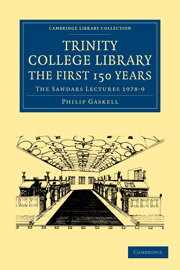Book contents
- Frontmatter
- Contents
- Lists of illustrations and plans
- Preface
- Terms and conventions
- Abbreviations
- 1546–1600
- 1 College libraries in the sixteenth century
- 2 The libraries of Michaelhouse and the King's Hall
- 3 The establishment of Trinity College Library
- 4 The need for books at Trinity in the sixteenth century
- 5 The College Library in the mid-sixteenth century
- 6 The College Library in 1600
- 7 The development of the collection up to 1600
- 8 Private libraries
- 1601–1695
- APPENDIXES
- Index
6 - The College Library in 1600
Published online by Cambridge University Press: 05 August 2011
- Frontmatter
- Contents
- Lists of illustrations and plans
- Preface
- Terms and conventions
- Abbreviations
- 1546–1600
- 1 College libraries in the sixteenth century
- 2 The libraries of Michaelhouse and the King's Hall
- 3 The establishment of Trinity College Library
- 4 The need for books at Trinity in the sixteenth century
- 5 The College Library in the mid-sixteenth century
- 6 The College Library in 1600
- 7 The development of the collection up to 1600
- 8 Private libraries
- 1601–1695
- APPENDIXES
- Index
Summary
The earliest surviving inventory of the books in the College Library is included in the manuscript register of benefactors to Trinity known as the Memoriale. The initiative for this undertaking came from Sir Edward Stanhope, a Fellow of 1564–72, whose will, dated 28 February 1603, made very generous provision for the Library. Amongst other things Stanhope bequeathed £20 for making and placing in the Library a large vellum register book which was to contain the names and arms of all the benefactors to the College and of its Masters. ‘This Booke’, he went on, ‘must further bee kepte for the publike Register Booke of all the particular Bookes, Mapps, Globes ore other ornaments whatsoever belongenge or hereafter to beelonge to the saide Colledge Librarie.’
Stanhope died in 1608, and the register book was duly written out and illuminated, probably following notes and sketches left by Stanhope himself. The scribe, it appears from the College accounts, was John Scott, who probably completed the first lists of benefactors, of Masters, and of donations to the Library between 1612 and 1614, at a cost, including a lavish binding, of about £40. The Memoriale, as it was then named, continued in use until the 1670s, chiefly as a record of donations to the College Library, and it remains in the Library as MS R.17.8.
The heading of the section of the Memoriale which concerns the Library may be translated as follows:
Catalogue of books placed in the Library of Trinity College, Cambridge, by the generosity of the College's benefactors. […]
- Type
- Chapter
- Information
- Trinity College Library. The First 150 YearsThe Sandars Lectures 1978–9, pp. 34 - 45Publisher: Cambridge University PressPrint publication year: 2010First published in: 1980



